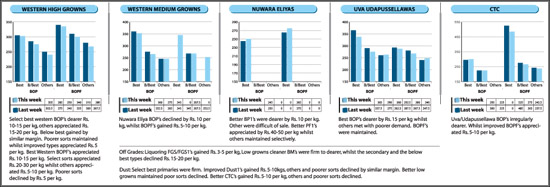|
Tea Report
Active buying from Japan, Russia and UK
Bartleet Tea Surveillance Report up to June 25:

The quantity of tea arriving at the Colombo Auction this week
decreased to 7.456mkg from 8.076mkg traded in the previous week’s sale.
Meanwhile the Ex-estate crops too showed a decrease from 1.187mkg to
1.098mkg.
Market segments: In the Ex-estate segment prices moved up a tad
compared to last week. Meanwhile, the volumes of tea at the auction were
quite brighter and the buyers from Japan, Russia, UK and the continent
showed an active buying pattern.
According to industry sources prices are said to scale-up due to the
shortfall in the world market created by a Kenyan deficit, forcing the
hand of ‘wait and see’ buyers to come into the market quite
aggressively.
Meanwhile, the anticipated Uva season is round the corner and the
teas will fetch good prices, while making the buying pattern stronger.
The industry anticipates that prices are here to stay as currently
there is no surplus. In the Tippy market segment, good demand was
witnessed where Iran was very active whilst buyers from Dubai and CIS
were moderate in their buying patterns.
Meanwhile buyers from Turkey and Saudi Arabia were very selective.
The Leafy grade segment bottom OP, OPA and Pekoe grades came down
drastically due to lack of inquiries from Iraq. OP1, BOP1 grades were
selling well above last levels.
Shippers to Syria were active but the buying pattern of exporters to
Turkey was irregular.
Quality control: According to a senior official, the Tea Board is in
search of new laws to constrict quality control on exports and prevent
shipments, which are considered teas below a certain minimum standard.
According to the Sri Lanka Tea Board chairman, national legislation
was required to enforce the ISO 3720 standard on tea exports and the
major tea producing countries last month agreed to stick to ISO 3720 as
a minimum quality level to prevent oversupply from depressing prices.
This agreement was made at the Intergovernmental Group on Tea of the
Food and Agriculture Organization of the United Nations meeting which
was held in Hangzhou, China.
Harmony now: According to senior stakeholders, the billion-dollar
industry in the island remains quite divided, backbiting over
unimportant matters and is consequently losing-out on benefits it can
otherwise win as other industries have done.
Meanwhile, the CTTA Chairman claimed that rising costs of production
could wipe-out the gains from lucrative tea prices and pressure the
industry to a self-destructive state.
The production costs had shot-up over 25 percent in 2007 and now the
industry has to contend with even more costs due to the high oil prices
fuelling inflation.
He stated that the industry which is dominated by the buyers,
producers and the brokers, should all work in an harmonization manner
for the greater benefit of the industry to achieve long-term
sustainability in these tough times.
Indian shutdown: India’s most famous commodity export, Darjeeling
tea, is being hit hard by the industrial strife in the Himalayan region
where it is grown. The country is anticipated to lose Rs. 20 million
($470,000) a day according to some industry sources.
The delay in plucking of leaves and transport of tea for export
auctions due to the ongoing Gorkha Janamukti Morcha (GJM) sponsored
shutdown in West Bengal’s Darjeeling hills will get worse if the
indefinite shutdown continues and is anticipated to give an edge to tea
from Sri Lanka according to some traders.
Due to the tensions, the industry is looking at a 20-25 percent drop
in exports.
Assam tea outbound to Kolkata is also said to be hit by road
blockade. Global trends: Indian tea exports fell to 156.7mkg in 2007
from a level of 218.7mkg in 2006, according to Indian Tea Board figures.
It was due mainly to the fall in exports to Iraq.
The export of tea from India was marginally higher by about two
million kilos for the four month period ended April 2008, reaching
55.14mkg. Meanwhile, according to sources, Pakistan and Egypt may buy
more from India as tea from their major market Kenya has become costly
because of crop shortfalls.
Additionally, Indian tea production has shot-up by about 18mkg till
April-end in 2008. The Kenyan production for the same period has shown
29 per cent drop to 98.1mkg from 139.3mkg in the previous year.
Plantation stocks: With reference to the weekly surveillance of the
19 plantation stocks, 12 were lower in value whilst four reported a gain
and three reported static. Agalawatta plantations reported a gain of 24
percent respectively, week on week.
|

